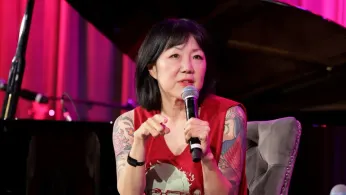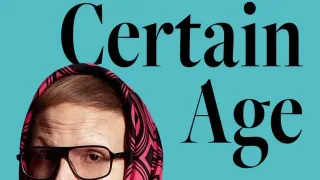
4 hours ago
Margaret Cho To JK Rowling “I Hope Your Pubic Hair Turns to Steel Wool”
READ TIME: 3 MIN.
On a recent weekend, bisexual comedian and actor Margaret Cho posted a TikTok video in which she sharply criticized author JK Rowling, known globally for the Harry Potter series, over her “gender-critical” stance on transgender issues . In the video, Cho—wearing a t-shirt in the colors of the trans pride flag—called Rowling “despicable” and urged her to “shut up,” quipping, “That’s why your name is JK, because you are a joke.” She went on to joke about a menopausal curse: “I hope that when you face menopause, you have to take a lot of gender-affirming care, as I do. And when you are taking these hormones, they make your pubes grow out so thick and hard it’s like steel wool and if anyone goes down to eat it, they get a face full of scars. I hope they start calling you ‘barbed wire.’” The video quickly amassed more than 475,000 views and generated a flood of supportive comments from LGBTQ+ viewers and allies .
JK Rowling has been a polarizing figure in recent years due to her public comments and essays expressing skepticism about certain aspects of transgender rights and identity. Rowling’s views, which she describes as “gender-critical,” have been widely criticized by LGBTQ+ advocacy groups and many public figures for perpetuating harmful stereotypes and contributing to a climate of hostility toward transgender people . Her stance has led to calls for boycotts of her work and has divided fans of the Harry Potter franchise, with some celebrities distancing themselves from her and others defending her right to free speech.
Margaret Cho, a veteran comedian known for her outspoken support of LGBTQ+ rights, has a long history of using humor to address social issues, including racism, sexism, and homophobia. Her recent TikTok video is consistent with her style of blending sharp satire with advocacy, using comedy to call out what she perceives as injustice. In the video, Cho explicitly links her critique of Rowling to broader issues of trans inclusion and the importance of gender-affirming care, a medically recognized treatment for many transgender and nonbinary people. By invoking her own experience with gender-affirming care, Cho personalizes the issue and underscores the stakes for transgender people affected by public figures’ rhetoric .
The response to Cho’s video has been overwhelmingly positive among LGBTQ+ social media users, with comments praising her as “the people’s person” and affirming her role as a vocal ally. The incident also follows recent controversy involving actor Keira Knightley, who faced backlash after footage surfaced of her laughing at a question about Rowling’s trans views. Knightley, who is set to voice a character in a new Harry Potter audiobook, defended her participation in the franchise, stating she was “not aware” of calls to boycott the project due to Rowling’s comments . These episodes illustrate how Rowling’s public statements continue to reverberate through the entertainment industry and LGBTQ+ communities.
Cho’s viral moment comes amid ongoing global debates about transgender rights, healthcare access, and the role of public figures in shaping cultural attitudes. Advocacy organizations emphasize that transgender people face disproportionate levels of discrimination, violence, and barriers to healthcare, and that public figures’ statements can have real-world consequences for trans communities. By using humor to challenge Rowling, Cho joins a chorus of LGBTQ+ voices and allies who seek to counter what they see as harmful rhetoric and to promote greater understanding and acceptance of transgender people.
Margaret Cho’s TikTok video represents a vivid example of how comedians and public figures are using social media to engage with contentious cultural debates, particularly around LGBTQ+ rights. While Cho’s remarks were delivered in her signature comedic style, they reflect serious concerns within LGBTQ+ communities about the impact of high-profile “gender-critical” rhetoric. The viral nature of the video underscores both the reach of social media in amplifying marginalized voices and the ongoing divisions over trans inclusion in public life .






